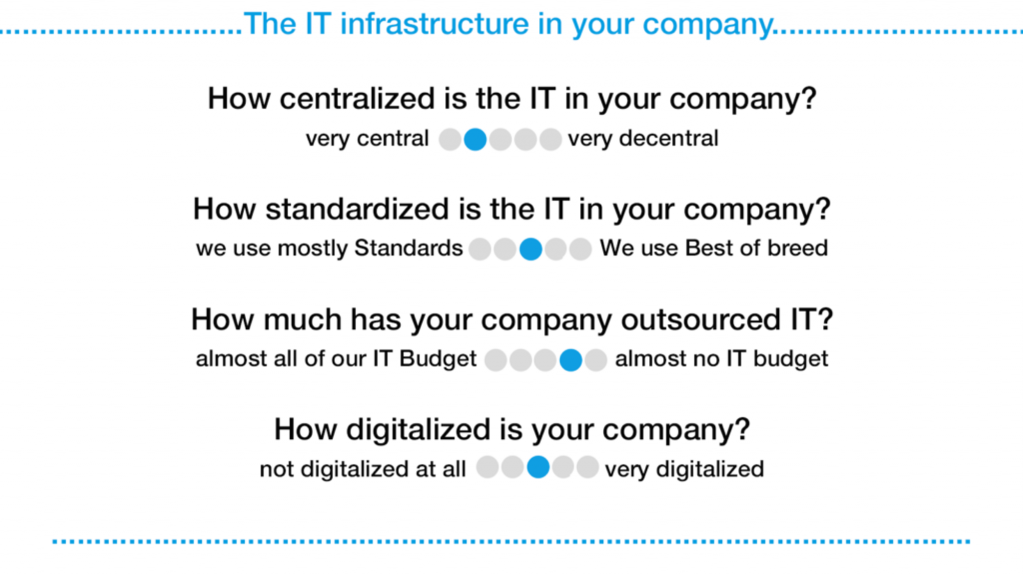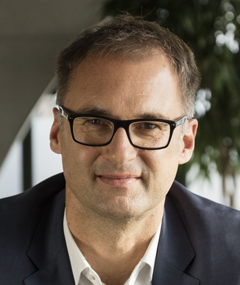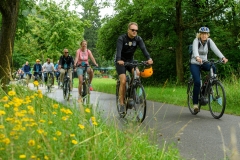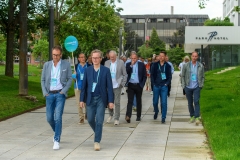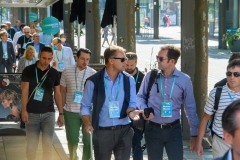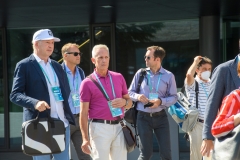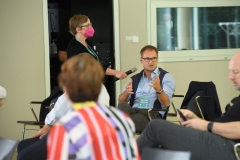
Revenue
222,88 bn €Employees
665kDetails
Dr Sven Lorenz has been responsible for IT as Vice President of Information Technology and CIO at Dr. Ing. h.c. F. Porsche AG from 2002 until 2017. Lorenz studied Information Technology and Business Administration at the University of Karlsruhe and the University of Oregon in the USA. After winning a scholarship from the IBM Scientific Centre he achieved his doctorate in the field of artificial intelligence, in natural language understanding, and undertook research at the Institute for Natural Language Processing at the University of Stuttgart. Following periods working for IBM in software development and A.T. Kearney in management consulting, at the end of the 1990s Lorenz became Managing Director of an e-business start-up within the Deutsche Post Group, before moving to Porsche AG in 2002. At the awards for “CIO of the Year” 2006, he won second place in the “large company” category. Since 2013 he has been teaching Strategic IT Management at the University of Stuttgart.
In October 2017 Lorenz took over a new responsibility in the Volkswagen Group as Chief Process Officer, responsible for harmonizing and integrating business processes across the Group.
The Volkswagen Group, with its headquarters in Wolfsburg, is one of the world’s leading automobile manufacturers and the largest carmaker in Europe.
In difficult market conditions, the number of Group vehicles delivered to customers decreased to 9.3 million in 2020 (2019: 10.97 million). The global car market share rose slightly to 13 percent.
22.0 percent of the new cars in Western Europe originate in the production of the Volkswagen Group. Group sales revenue in 2020 totaled € 222.88 billion (2019: € 252.63 billion), while earnings after tax amounted to € 8.3 billion (2019: € 13.35 billion).
The Group comprises twelve brands from seven European countries: Volkswagen Passenger Cars, Audi, SEAT, ŠKODA, Bentley, Bugatti, Lamborghini, Porsche, Ducati, Volkswagen Commercial Vehicles, Scania and MAN.
Each brand has its own character and operates as an independent entity on the market. The product spectrum ranges from motorcycles to small cars and luxury vehicles. In the commercial vehicle sector, the products include ranges from pick-ups, buses and heavy trucks.
The Volkswagen Group is also active in other fields of business, manufacturing large-bore diesel engines for marine and stationary applications, turbochargers and -machinery, special gear units, compressors and chemical reactors.
In addition, the Volkswagen Group offers a wide range of financial services, including dealer and customer financing, leasing, banking and insurance activities, and fleet management.
The Group operates 123 production plants in 20 European countries and a further 11 countries in the Americas, Asia and Africa. Every weekday, 665,000 employees worldwide produce around 44,170 vehicles, and work in vehicle-related services or other fields of business. The Volkswagen Group sells its vehicles in 153 countries.
With its “TOGETHER – Strategy 2025” future program, the Volkswagen Group is paving the way for the biggest change process in its history: the realignment of one of the best carmakers to become a globally leading provider of sustainable mobility.
In order to achieve this, the Group will be transforming its automotive core business and will be launching a further 30-plus fully electric cars by 2025, as well as expanding battery technology and autonomous driving as new core competences. Furthermore, a cross-brand business unit for intelligent mobility solutions is to be established as a second pillar. The strategic investment in on-demand mobility provider Gett was the first step in this direction; over the coming years, further services such as robotaxis, carsharing or transport on-demand will be grouped around this nucleus. The successful transformation requires the Group to place its innovation power on an even broader footing: the Group is driving forward with digitalization across all brands, areas and functions. At the same time, Volkswagen will rely to a greater extent than before on partnerships, acquisitions and strategic investments.
To finance investments in future topics, the Group aims to significantly increase efficiency across all areas, brands and regions.
- October 2018- present: Head of Group Business Process Management, Volkswagen AG; focusing on Process, Data and Digital Program Governance in the Volkswagen Group
- October 2013-2019: Lecturer for Strategic IT-Management, Universität Stuttgart
- January 2002-September 2018: CIO of Dr. Ing. h.c. F. Porsche AG
- April 1997-December 2001: Managing Director of Deutsche PostCom GmbH
- January 1996-March 1997: Manager at A.T. Kearney
- April 1993-December 1995: Technical Project Lead at IBM Deutschland Entwicklung GmbH
- April 1990-March 1993: Research Assistant at University of Stuttgart
- October 1987-June 1989: Working student at IBM Wissenschaftliches Zentrum Heidelberg
- April 1990-July 1993: Computational Linguistics at University of Stuttgart, Dr phil.
- September 1986-June 1987: Computer Science & Business Administration at University of Oregon
- October 1983-June 1989: Computer Science & Business Administration at Karlsruhe Institute of Technology (KIT), Dipl.-Inform.
- CIO des Jahres 2006 (2. Platz Großunternehmen)
